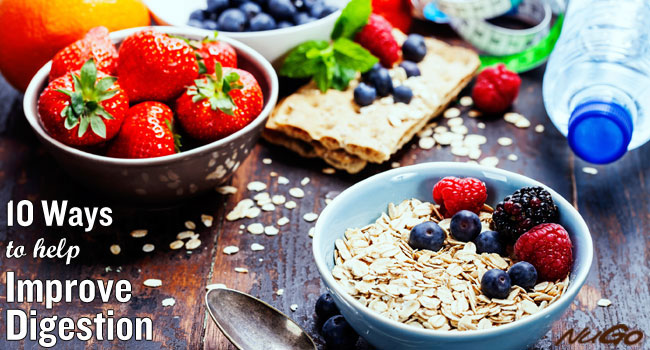“You are what you eat.” It’s not just a silly idiom. What you eat determines what nutrients are available for your body to do its job, and affects how you’ll feel throughout the day.
But how you feel is also largely dependent on how well you digest what you eat. Having healthy digestion is a big part of making sure your body can use the good nutrients you take in, and get rid of the toxins and waste you don’t need. Use these easy tips to improve digestion and help yourself feel even better in your body!
1. Drink warm water before a meal – By increasing circulation in your gastrointestinal tract, warm water primes your body to break down food. Drinking warm water before a meal is basically like preheating the oven so it can do its job more efficiently.
2. Eat a mix of soluble and insoluble fiber – It takes two to make a thing go right. Especially when we’re talking about the two types of fiber and the “thing” is digestion. Soluble fiber absorbs water in the stomach, while insoluble fiber helps to push food through the digestive tract. When working together, the two types of fiber keep the gut clean and efficient, while also helping to slow the absorption of fats and sugar into the bloodstream. Eat a mix of fruits, vegetables, and whole grains to get both types of fiber.
3. Let yourself de-stress – Have you ever been so stressed that you literally felt sick to your stomach? It happens. Stress can wreak havoc on your digestive system. To improve digestion, take some time every day to relieve stress, so you can keep your stomach settled and your body working at its best.
4. Exercise regularly – When you exercise, you allow your intestinal muscles to contract, which moves food through your body at a regular pace. Inactivity, on the other hand, can be a major cause of constipation. And no one likes constipation. So get moving!
5. Stay hydrated – Every cell in your body needs water to do its job correctly, so when you’re dehydrated, your digestive system can’t work as well as it should. Plus, when your body is low on water, digested food can harden in your large intestine, making it harder to eliminate waste from your body. Drink water to keep your gut clean, avoid constipation, and improve digestion.
6. Trim the fat – Because fat is hard to digest, eating high-fat foods can seriously slow down digestion. When digestion slows, you can get “backed up” internally. Better to avoid fried foods and the tummy troubles they can cause.
7. Go slow – Don’t rush through your meals. Take time to chew and taste. Chewing your food properly makes it easier to digest. When you’re not rushing, you’re also less likely to swallow air, and are thereby less likely to experience bloating.
8. …and go pro – Probiotics, that is. Probiotics are healthy bacteria found naturally in your body. They help regulate digestion while also helping your body to absorb more nutrients. Recent research shows that probiotics may also help with weight loss and improving mood. You can find probiotics in yogurt and other fermented foods.
9. Identify your “problem foods” – If you notice issues with your digestion, be aware of what you ate before you started feeling discomfort. This way, you’ll be able to identify foods you should steer clear of in the future.
10. Be your own chef – When you prepare your own food, the sight and smells of the ingredients you use can trigger your body to prepare for digestion by increasing production of the enzymes that will help break down your meal.
And, importantly: to improve digestion, make sure you’re getting enough fiber in your diet! To help you reach your daily recommended goal of 21-38 grams, try a tasty Fiber d’Lish bar for a mix of soluble, insoluble, and prebiotic fiber.
If you suspect your digestive troubles may be more serious, consult a health professional.

